Slow Rust Builds?
Here are some tips to speed up your compile times. This list was originally released on my private blog, but I decided to update it and move it here.
All tips are roughly ordered by impact so you can start from the top and work your way down.
Table of Contents
Click here to expand the table of contents.
- General Tips
- Update The Rust Compiler And Toolchain
- Use cargo check Instead Of cargo build
- Remove Unused Dependencies
- Update Dependencies
- Find the slow crate in your codebase
- Profile Compile Times
- Troubleshoot Slow Incremental Builds
- Replace Heavy Dependencies
- Split Big Crates Into Smaller Ones Using Workspaces
- Disable Unused Features Of Crate Dependencies
- Add Features For Expensive Code
- Find The Root Cause For Rebuilds
- Cache Dependencies With sccache
- Cranelift: The Alternative Rust Compiler
- Switch To A Faster Linker
- macOS Only: Faster Incremental Debug Builds
- macOS Only: Exclude Rust Compilations From Gatekeeper
- Windows Only: Set Up Dev Drive For Rust
- Tweak Codegen Options And Compiler Flags
- Avoid Procedural Macro Crates
- Find Expensive Proc Macros
- Conditional Compilation for Procedural Macros
- Generics: Use an Inner Non-Generic Function
- Improve Workspace Build Times with cargo-hakari
- Speeding up incremental Rust compilation with dylibs
- Switch To The New Parallel Compiler Frontend
- Use A Scratch Disk For Faster Builds
- Invest In Better Hardware
- Compile in the Cloud
- Cache All Crates Locally
- Test Execution
- CI Builds
- Faster Docker Builds
- IDE Specific Optimizations
General Tips
Update The Rust Compiler And Toolchain
Make sure you use the latest Rust version:
rustup updateMaking the Rust compiler faster is an ongoing process. Thanks to their hard work, compiler speed has improved 30-40% across the board year-to-date, with some projects seeing up to 45%+ improvements. It pays off to keep your toolchain up-to-date.
Use cargo check Instead Of cargo build
# Slow 🐢
cargo build
# Fast 🐇 (2x-3x speedup)
cargo checkMost of the time, you don’t even have to compile your project at all; you just want to know if you messed up somewhere. Whenever you can, skip compilation altogether. What you need instead is laser-fast code linting, type- and borrow-checking.
Use cargo check instead of cargo build whenever possible.
It will only check your code for errors, but not produce an executable binary.
Consider the differences in the number of instructions between cargo check on
the left and cargo debug in the middle. (Pay attention to the different
scales.)
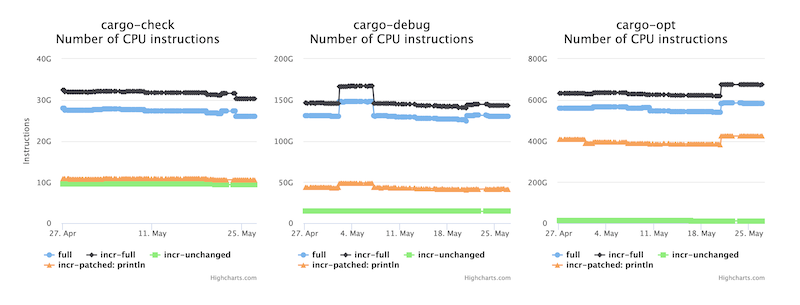
A sweet trick I use is to run it in the background with cargo watch. This way, it will cargo check
whenever you change a file.
Bonus: Use cargo watch -c to clear the screen before every run.
Remove Unused Dependencies
# Install cargo-machete 🔪️
cargo install cargo-machete && cargo machete
# Install cargo-shear ✂️🐑
cargo install cargo-shear
# Install cargo-udeps 🧼🧹️
cargo install cargo-udeps --lockedDependencies sometimes become obsolete after refactoring. From time to time it helps to check if you can remove any unused dependencies.
The above tools will list all unused dependencies in your project. Each tool has its limitations, producing both false positives and false negatives. Using all three tools together provides the best results.
Analyzing dependencies of crates in this directory...
cargo-machete found the following unused dependencies in <project>:
crate1 -- <project>/Cargo.toml:
clap
crate2 -- <project>/crate2/Cargo.toml:
anyhow
async-once-cell
dirs
log
tracing
urlMore info on the cargo-machete, cargo-shear, and cargo-udeps project pages.
Thanks for mentioning cargo-shear and cargo-udeps to reader Nicholas Nethercote who is the author of the Rust Performance Book and the famous How to speed up the Rust compiler series.
Update Dependencies
- Run
cargo updateto update to the latest semver compatible version. - Run
cargo outdated -wRto find newer, possibly incompatible dependencies. Update those and fix code as needed. - Run
cargo tree --duplicateto find dependencies which come in multiple versions. Aim to consolidate to a single version by updating dependencies that rely on older versions. (Thanks to /u/dbdr for pointing this out.)
(Instructions by /u/oherrala on Reddit.)
On top of that, use cargo audit to
get notified about any vulnerabilities which need to be addressed, or deprecated
crates which need a replacement.
Find the slow crate in your codebase
cargo build --timingsThis gives information about how long each crate takes to compile.
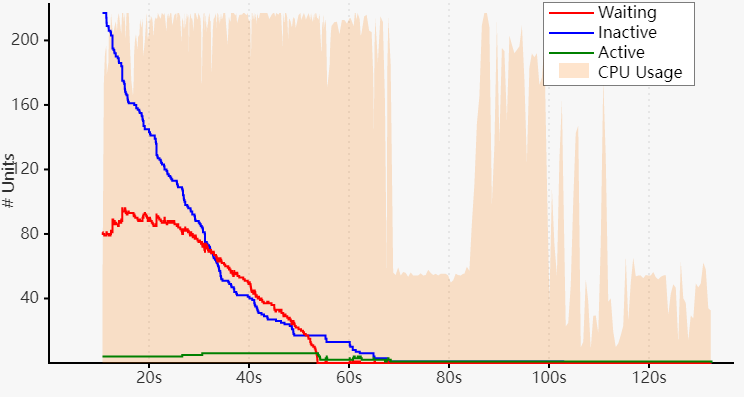
The red line in this diagram shows the number of units (crates) that are currently waiting to be compiled (and are blocked by another crate). If there are a large number of crates bottlenecked on a single crate, focus your attention on improving that one crate to improve parallelism.
The meaning of the colors:
- Waiting (red) — Crates waiting for a CPU slot to open.
- Inactive (blue) — Crates that are waiting for their dependencies to finish.
- Active (green) — Crates currently being compiled.
More info in the documentation.
Profile Compile Times
If you like to dig deeper than cargo --timings, Rust compilation can be profiled with cargo rustc -- -Zself-profile.
The resulting trace file can be visualized with a flamegraph or the Chromium
profiler:

Another golden one is
cargo-llvm-lines, which shows
the number of lines generated and the number of copies of each generic function in the
final binary. This can help you identify which functions are the most expensive
to compile.
$ cargo llvm-lines | head -20
Lines Copies Function name
----- ------ -------------
30737 (100%) 1107 (100%) (TOTAL)
1395 (4.5%) 83 (7.5%) core::ptr::drop_in_place
760 (2.5%) 2 (0.2%) alloc::slice::merge_sort
734 (2.4%) 2 (0.2%) alloc::raw_vec::RawVec<T,A>::reserve_internal
666 (2.2%) 1 (0.1%) cargo_llvm_lines::count_lines
490 (1.6%) 1 (0.1%) <std::process::Command as cargo_llvm_lines::PipeTo>::pipe_to
476 (1.5%) 6 (0.5%) core::result::Result<T,E>::map
440 (1.4%) 1 (0.1%) cargo_llvm_lines::read_llvm_ir
422 (1.4%) 2 (0.2%) alloc::slice::merge
399 (1.3%) 4 (0.4%) alloc::vec::Vec<T>::extend_desugared
388 (1.3%) 2 (0.2%) alloc::slice::insert_head
366 (1.2%) 5 (0.5%) core::option::Option<T>::map
304 (1.0%) 6 (0.5%) alloc::alloc::box_free
296 (1.0%) 4 (0.4%) core::result::Result<T,E>::map_err
295 (1.0%) 1 (0.1%) cargo_llvm_lines::wrap_args
291 (0.9%) 1 (0.1%) core::char::methods::<impl char>::encode_utf8
286 (0.9%) 1 (0.1%) cargo_llvm_lines::run_cargo_rustc
284 (0.9%) 4 (0.4%) core::option::Option<T>::ok_or_elseTroubleshoot Slow Incremental Builds
If your incremental builds are slower than expected, you might be bottlenecked on a particular crate in the rustc backend.
To diagnose this, you can use samply combined with the -Zhuman_readable_cgu_names=yes flag to profile the compiler and identify which codegen units are taking the longest to compile:
samply record cargo buildThis will help you identify if a particular crate is the long pole in your build. Once you’ve identified the bottleneck, you may be able to improve compile times by refactoring or splitting the problematic crate.
For more details on back-end parallelism in the Rust compiler, see Nicholas Nethercote’s blog post.
Another useful flag is -Zprint-mono-items=yes, which prints all monomorphized items during compilation. This can help you understand what’s being generated in each CGU.
RUSTFLAGS="-Zprint-mono-items=yes" cargo +nightly build ⏎Thanks to Caspar (asparck on Reddit) for this tip!
Replace Heavy Dependencies
From time to time, it helps to shop around for more lightweight alternatives to popular crates.
Again, cargo tree is your friend here to help you understand which of your
dependencies are quite heavy: they require many other crates, cause
excessive network I/O and slow down your build. Then search for lighter
alternatives.
Also, cargo-bloat has a --time
flag that shows you the per-crate build time. Very handy!
Here are a few examples:
| Crate | Alternative |
|---|---|
| serde | miniserde, nanoserde |
| reqwest | ureq |
| clap | lexopt |
Here’s an example where switching crates reduced compile times from 2:22min to 26 seconds.
Split Big Crates Into Smaller Ones Using Workspaces
Cargo has that neat feature called workspaces, which allow you to split one big crate into multiple smaller ones. This code-splitting is great for avoiding repetitive compilation because only crates with changes have to be recompiled. Bigger projects like servo and vector make heavy use of workspaces to reduce compile times.
Disable Unused Features Of Crate Dependencies
cargo-features-manager is a relatively new tool that helps you to disable unused features of your dependencies.
cargo install cargo-features-manager
cargo features pruneFrom time to time, check the feature flags of your dependencies. A lot of library maintainers take the effort to split their crate into separate features that can be toggled off on demand. Maybe you don’t need all the default functionality from every crate?
For example, tokio has a ton of
features
that you can disable if not needed.
Another example is bindgen, which enables clap support by default for its
binary usage. This isn’t needed for library usage, which is the common use-case.
Disabling that feature improved compile time of rust-rocksdb by ~13s and ~9s
for debug and release builds
respectively. Thanks to
reader Lilian Anatolie Moraru for mentioning
this.
Fair Warning
It seems that switching off features doesn’t always improve compile time. (See tikv’s experiences here.) It may still be a good idea for improving security by reducing the code’s attack surface. Furthermore, disabling features can help slim down the dependency tree.
You get a list of features of a crate when installing it with cargo add.
If you want to look up the feature flags of a crate, they are listed on docs.rs. E.g. check out tokio’s feature flags.
After you removed unused features, check the diff of your Cargo.lock file to
see all the unnecessary dependencies that got cleaned up.
Add Features For Expensive Code
[features]
# Basic feature for default functionality
default = []
# Optional feature for JSON support
json = ["serde_json"]
# Another optional feature for more expensive or complex code
complex_feature = ["some-expensive-crate"]Not all the code in your project is equally expensive to compile. You can use Cargo features to split up your code into smaller chunks on a more granular level than crates. This way, you can compile only the functionality you need.
This is a common practice for libraries. For example, serde has a feature
called derive that enables code generation for serialization and
deserialization. It’s not always needed, so it’s disabled by default.
Similarly, Tokio and reqwest have a lot of features that can be enabled or
disabled.
You can do the same in your code. In the above example, the json feature
in your Cargo.toml enables JSON support while the complex_feature feature
enables another expensive code path.
Find The Root Cause For Rebuilds
Sometimes many crates rebuild even when no code has changed, often due to environment variable differences between build processes (like your Makefile builds vs rust-analyzer vs CI builds).
Use cargo’s fingerprint logging to identify exactly why rebuilds are triggered:
export CARGO_LOG="cargo::core::compiler::fingerprint=info"
export RUST_LOG=trace
cargo build -vvLook for lines showing what caused the rebuild. For example:
INFO prepare_target: cargo::core::compiler::fingerprint: dirty: EnvVarChanged { name: "VIRTUAL_ENV", old_value: None, new_value: Some("/path/to/.venv") }
Dirty pyo3-build-config v0.24.1: the env variable VIRTUAL_ENV changedSee that “Dirty” line? It tells you exactly what caused the rebuild. You can grep for that line to find all rebuild causes.
Common culprits include:
- Environment variables (CC, CXX, VIRTUAL_ENV, PATH changes)
- Feature flag mismatches between different build tools
- Different cargo profiles being used
- Timestamp differences in generated files
Once you identify the cause, ensure consistency across all your build processes. For rust-analyzer in VS Code, you can configure matching environment variables in .vscode/settings.json:
{
"rust-analyzer.check.extraEnv": {
"CC": "clang",
"CXX": "clang++",
"VIRTUAL_ENV": "/path/to/your/.venv"
},
"rust-analyzer.cargo.features": "all"
}This debugging approach can dramatically reduce unnecessary rebuilds when different tools use inconsistent environments.
Credit: This technique was mentioned in this write-up by Ishan Bhanuka.
Cache Dependencies With sccache
Another neat project is sccache by Mozilla, which caches compiled crates to avoid repeated compilation.
I had this running on my laptop for a while, but the benefit was rather negligible, to be honest. It works best if you work on a lot of independent projects that share dependencies (in the same version). A common use-case is shared build servers.
Cranelift: The Alternative Rust Compiler
Did you know that the Rust project is using an alternative
compiler that runs in parallel with rustc for every CI build?
rustc_codegen_cranelift,
also called CG_CLIF, is an experimental backend for the Rust compiler that
is based on the Cranelift compiler framework.
Here is a comparison between rustc and Cranelift for some popular crates (blue
means better):
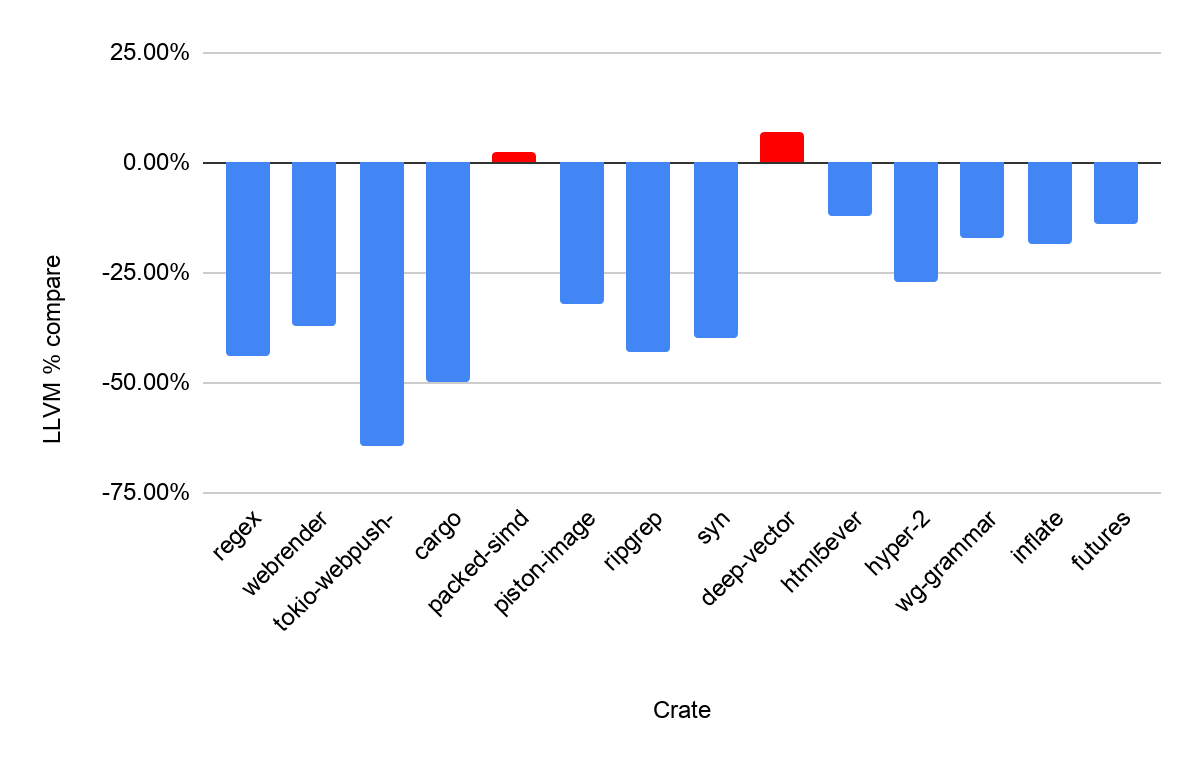
The compiler creates fully working executable binaries. They won’t be optimized as much, but they are great for local development.
A more detailed write-up is on Jason Williams’ page, and the project code is on Github.
Switch To A Faster Linker
What is a linker?
A linker is a tool that
combines multiple object files into a single executable.
It’s the last step in the compilation process.
You can check if your linker is a bottleneck by running:
cargo clean
cargo +nightly rustc --bin <your_binary_name> -- -Z time-passesIt will output the timings of each step, including link time:
...
time: 0.000 llvm_dump_timing_file
time: 0.001 serialize_work_products
time: 0.002 incr_comp_finalize_session_directory
time: 0.004 link_binary_check_files_are_writeable
time: 0.614 run_linker
time: 0.000 link_binary_remove_temps
time: 0.620 link_binary
time: 0.622 link_crate
time: 0.757 link
time: 3.836 total
Finished dev [unoptimized + debuginfo] target(s) in 42.75sIf the link step is slow, you can try to switch to a faster alternative:
| Linker | Platform | Production Ready | Description |
|---|---|---|---|
lld | Linux/macOS | Yes | Drop-in replacement for system linkers |
mold | Linux | Yes | Optimized for Linux |
zld | macOS | No (deprecated) | Drop-in replacement for Apple’s ld linker |
macOS Only: Faster Incremental Debug Builds
Rust 1.51 added a flag for faster incremental debug builds on macOS. It can make debug builds multiple seconds faster (depending on your use-case). Some engineers report that this flag alone reduces compilation times on macOS by 70%.
Add this to your Cargo.toml:
[profile.dev]
split-debuginfo = "unpacked"The flag might become the standard for macOS soon. It is already the default on nightly.
macOS Only: Exclude Rust Compilations From Gatekeeper
Gatekeeper is a system on macOS, which runs security checks on binaries. This can cause Rust builds to be slower by a few seconds for each iteration. The solution is to add your terminal to the Developer Tools, which will cause processes run by it to be excluded from Gatekeeper.
- Run
sudo spctl developer-mode enable-terminalin your terminal. - Go to System Preferences, and then to Security & Privacy.
- Under the Privacy tab, go to
Developer Tools. - Make sure your terminal is listed and enabled. If you’re using any third-party terminals like iTerm or Ghostty, add them to the list as well.
- Restart your terminal.
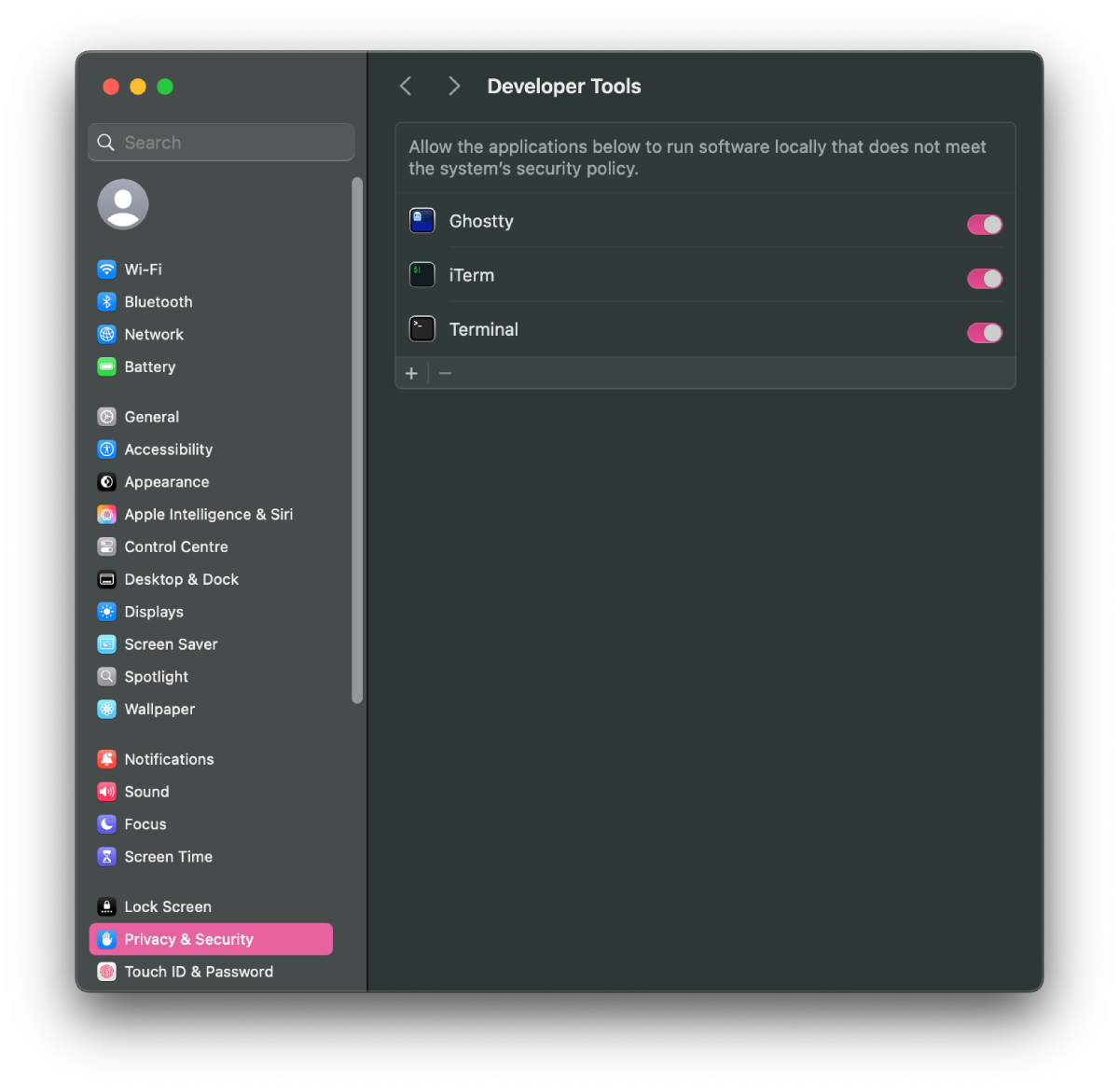
Thanks to the nextest and Zed developers for the tip.
Windows Only: Set Up Dev Drive For Rust
Windows 11 includes Dev Drive, a file system optimized for development. According to Microsoft, you can expect a speed boost of around 20-30% by using Dev Drive:
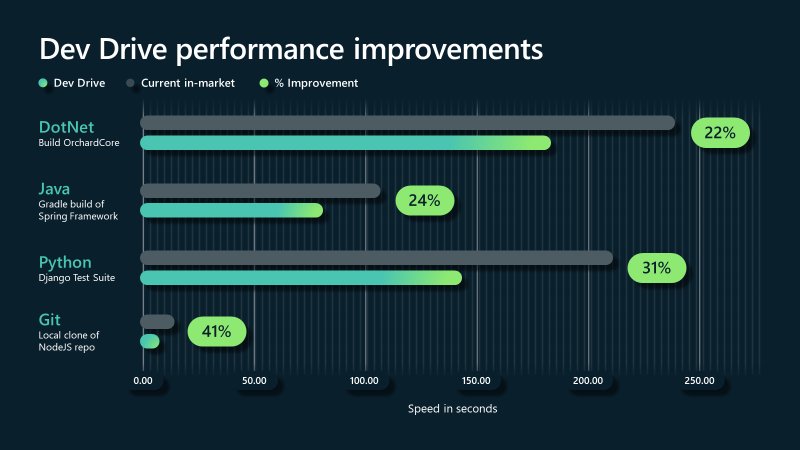
To improve Rust compilation speed, move these to a Dev Drive:
- Rust toolchain folder (
CARGO_HOME) - Your project code
- Cargo’s
targetdirectory
You can go one step further and add the above folders to your antivirus exclusions as well for another potential speedup. You can find exclusion settings in Windows Security under Virus & threat protection settings.

Thanks to the nextest team for the tip.
Tweak Codegen Options And Compiler Flags
Rust comes with a huge set of settings for code generation. It can help to look through the list and tweak the parameters for your project.
There are many gems in the full list of codegen options. For inspiration, here’s bevy’s config for faster compilation.
Avoid Procedural Macro Crates
If you heavily use procedural macros in your project (e.g., if you use serde),
it might be worth it to play around with opt-levels in your Cargo.toml.
[profile.dev.build-override]
opt-level = 3As reader jfmontanaro mentioned on Github:
I think the reason it helps with build times is because it only applies to build scripts and proc-macros. Build scripts and proc-macros are unique because during a normal build, they are not only compiled but also executed (and in the case of proc-macros, they can be executed repeatedly). When your project uses a lot of proc-macros, optimizing the macros themselves can in theory save a lot of time.
Another approach is to try and sidestep the macro impact on compile times with watt, a tool that offloads macro compilation to Webassembly.
From the docs:
By compiling macros ahead-of-time to Wasm, we save all downstream users of the macro from having to compile the macro logic or its dependencies themselves.
Instead, what they compile is a small self-contained Wasm runtime (~3 seconds, shared by all macros) and a tiny proc macro shim for each macro crate to hand off Wasm bytecode into the Watt runtime (~0.3 seconds per proc-macro crate you depend on). This is much less than the 20+ seconds it can take to compile complex procedural macros and their dependencies.
Note that this crate is still experimental.
Find Expensive Proc Macros
RUSTFLAGS="-Zmacro-stats" cargo +nightly buildSome macros have a big compile-time cost; but exactly how big? It can help to quantify the costs to see if a macro is worth optimizing (or removing). One way is to understand exactly how much code they generate.
One way is to use cargo expand to see the generated code, but that doesn’t scale to large codebases and the output is hard to quantify.
The alternative is to use the -Zmacro-stats flag to identify proc macros that generate a lot of code.
This tool has already led to successful optimizations in projects like Bevy and Arbitrary.
For more information, read Nicholas Nethercote’s blog post on the topic.
Conditional Compilation for Procedural Macros
Procedural macros need to parse Rust code, and that is a relatively complex
task. Crates that depend on procedural macros will have to wait for the
procedural macro to compile before they can compile. For example, serde can be
a bottleneck in compilation times and can limit CPU utilization.
To improve Rust compile times, consider a strategic approach to handling serialization with Serde, especially in projects with a shared crate structure. Instead of placing Serde directly in a shared crate used across different parts of the project, you can make Serde an optional dependency through Cargo features.
Use the cfg or cfg_attr attributes to make Serde usage and derive in the
shared crate feature-gated. This way, it becomes an optional dependency that is
only enabled in leaf crates which actually perform
serialization/deserialization.
This approach prevents the entire project from waiting on the compilation of Serde dependencies, which would be the case if Serde were a non-optional, direct dependency of the shared crate.
Let’s illustrate this with a simplified example. Imagine you have a Rust project with a shared library crate and a few other crates that depend on it. You don’t want to compile Serde unnecessarily when building parts of the project that don’t need it.
Here’s how you can structure your project to use optional features in Cargo:
In your Cargo.toml for the shared crate, declare serde as an optional dependency:
[package]
name = "shared"
version = "0.1.0"
edition = "2021"
[dependencies]
serde = { version = "1.0", optional = true }In this crate, use conditional compilation to include serde only when the feature is enabled:
#[cfg(feature = "serde")]
use serde::{Serialize, Deserialize};
#[cfg_attr(feature = "serde", derive(Serialize, Deserialize))]
pub struct MySharedStruct {
// Your struct fields
}In the other crates, enable the serde feature for the shared crate if needed:
[package]
name = "other"
version = "0.1.0"
edition = "2021"
[dependencies]
shared = { path = "../shared", features = ["serde"] }You can now use MySharedStruct with Serde’s functionality enabled
without bloating the compilation of crates that don’t need it.
Generics: Use an Inner Non-Generic Function
If you have a generic function, it will be compiled for every type you use it with. This can be a problem if you have a lot of different types.
A common solution is to use an inner non-generic function. This way, the compiler will only compile the inner function once.
This is a trick often used in the standard library. For example, here is the
implementation of read_to_string:
pub fn read_to_string<P: AsRef<Path>>(path: P) -> io::Result<String> {
fn inner(path: &Path) -> io::Result<String> {
let mut file = File::open(path)?;
let size = file.metadata().map(|m| m.len() as usize).ok();
let mut string = String::with_capacity(size.unwrap_or(0));
io::default_read_to_string(&mut file, &mut string, size)?;
Ok(string)
}
inner(path.as_ref())
}You can do the same in your code: the outer function is generic, while it calls the inner non-generic function, which does the actual work.
Improve Workspace Build Times with cargo-hakari
Do you have a large Rust workspace with dependencies that:
- Are used in multiple crates
- Have different feature sets across those crates?
This situation can lead to long build times, as cargo will build each dependency multiple
times with different features depending on which crate is being built. This is
where cargo-hakari comes in.
It’s a tool designed to automatically manage “workspace-hack” crates.
In some scenarios, this can reduce consecutive build times by up to 50% or more. To learn more, check out the usage instructions and benchmarks in the official cargo-hakari documentation.
Speeding up incremental Rust compilation with dylibs
# Install the tool
cargo install cargo-add-dynamic
# Add a dynamic library to your project
cargo add-dynamic polars --features csv-file,lazy,list,describe,rows,fmt,strings,temporalThis will create a wrapper-crate around polars that is compiled as a dynamic
library (.so on Linux, .dylib on macOS, .dll on Windows).
Essentially, it patches the dependency with
[lib]
crate-type = ["dylib"]With this trick, you can save yourself the linking time of a dependency
when you only change your own code. The dependency itself will only be
recompiled when you change the features or the version.
Of course, this works for any crate, not just polars.
Read more about this on this blog post by Robert Krahn and the tool’s homepage.
Switch To The New Parallel Compiler Frontend
In nightly, you can now enable the new parallel compiler frontend.
To try it out, run the nightly compiler with the -Z threads=8 option:
RUSTFLAGS="-Z threads=8" cargo +nightly buildIf you find that it works well for you, you can make it the default by adding
-Z threads=8 to your ~/.cargo/config.toml file:
[build]
rustflags = ["-Z", "threads=8"]Alternatively, you can set an alias for cargo
in your shell’s config file (e.g., ~/.bashrc or ~/.zshrc):
alias cargo="RUSTFLAGS='-Z threads=8' cargo +nightly"When the front-end is executed in a multi-threaded setting using -Z threads=8,
benchmarks on actual code indicate that compilation times may decrease by as
much as 50%.
However, the gains fluctuate depending on the code being compiled. It is
certainly worth a try, though.
Here is a visualization of the parallel compiler frontend in action:
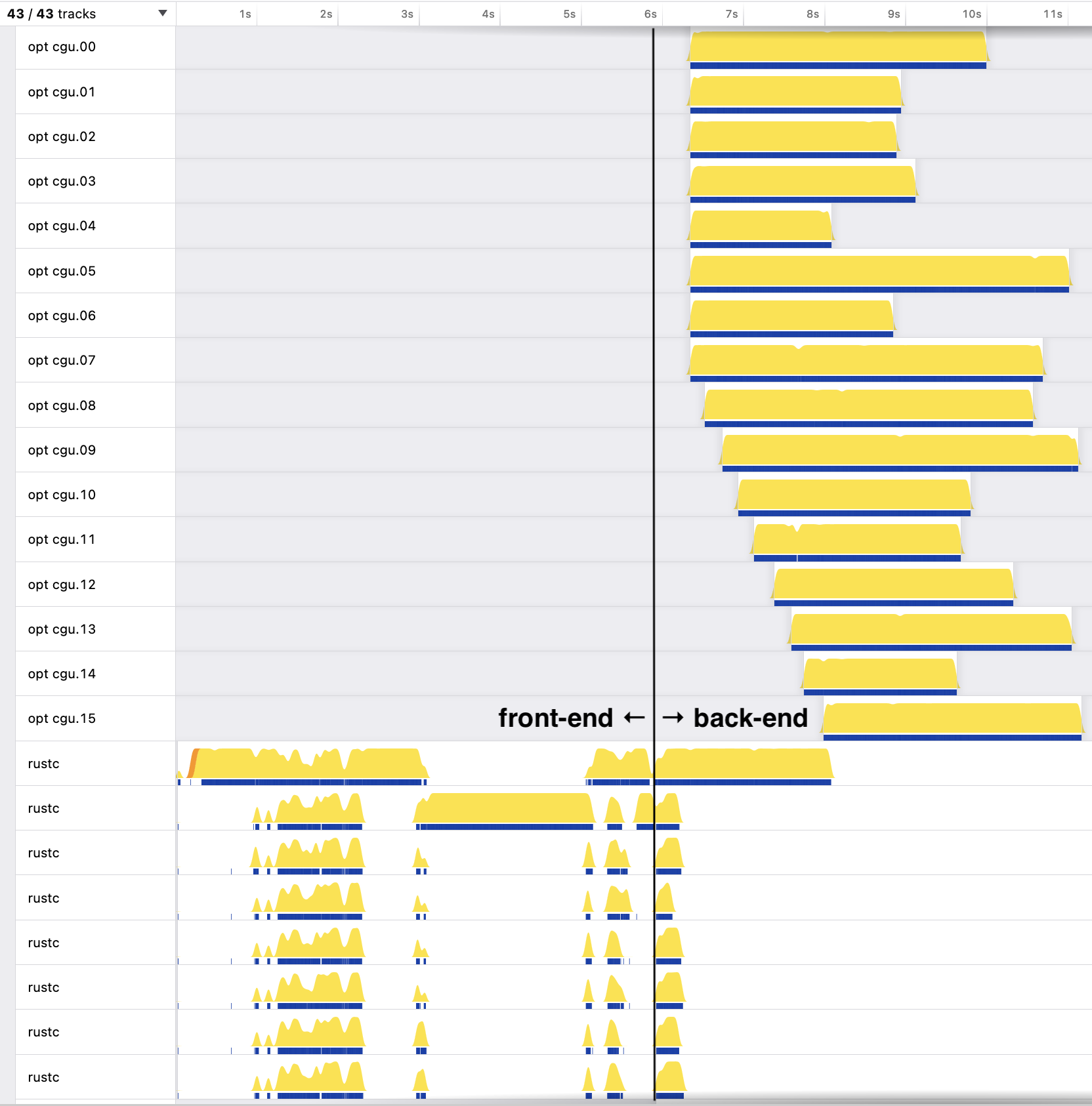
Find out more on the official announcement on the Rust blog.
Use A Scratch Disk For Faster Builds
Your filesystem might be the bottleneck. Consider using an in-memory filesystem like for your build directory.
Traditional temporary filesystem like tmpfs is limited to your RAM plus swap space and can be problematic for builds creating large intermediate artifacts.
Instead, on Linux, mount an ext4 volume with the following options:
-o noauto_da_alloc,data=writeback,lazytime,journal_async_commit,commit=999,nobarrierThis will store files in the page cache if you have enough RAM, with writebacks occurring later. Treat this as if it were a temporary filesystem, as data may be lost or corrupted after a crash or power loss.
Credits go to /u/The_8472 on Reddit.
Invest In Better Hardware
If you reached this point, the easiest way to improve compile times even more is probably to spend money on top-of-the-line hardware.
As for laptops, the M-series of Apple’s new Macbooks perform really well
for Rust compilation.
The benchmarks for a Macbook Pro with M1 Max are absolutely ridiculous — even in comparison to the already fast M1:
| Project | M1 Max | M1 Air |
|---|---|---|
| Deno | 6m11s | 11m15s |
| MeiliSearch | 1m28s | 3m36s |
| bat | 43s | 1m23s |
| hyperfine | 23s | 42s |
| ripgrep | 16s | 37s |
That’s a solid 2x performance improvement.
But if you rather like to stick to Linux, people also had great success with a multicore CPU like an AMD Ryzen Threadripper and 32 GB of RAM.
On portable devices, compiling can drain your battery and be slow. To avoid that, I’m using my machine at home, a 6-core AMD FX 6300 with 12GB RAM, as a build machine. I can use it in combination with Visual Studio Code Remote Development.
Compile in the Cloud
If you don’t have a dedicated machine yourself, you can offload the compilation
process to the cloud instead.
Gitpod.io is superb for testing a cloud build as they
provide you with a beefy machine (currently 16 core Intel Xeon 2.80GHz, 60GB
RAM) for free during a limited period. Simply add https://gitpod.io/# in
front of any Github URL.
Here is an example for one of my Hello Rust episodes.
Gitpod has a neat feature called prebuilds. From their docs:
Whenever your code changes (e.g. when new commits are pushed to your repository), Gitpod can prebuild workspaces. Then, when you do create a new workspace on a branch, or Pull/Merge Request, for which a prebuild exists, this workspace will load much faster, because all dependencies will have been already downloaded ahead of time, and your code will be already compiled.
Especially when reviewing pull requests, this could give you a nice speedup.
Prebuilds are quite customizable; take a look at the .gitpod.yml config of
nushell to get an
idea.
Cache All Crates Locally
If you have a slow internet connection, a big part of the initial build process is fetching all those shiny crates from crates.io. To mitigate that, you can download all crates in advance to have them cached locally. criner does just that:
git clone https://github.com/the-lean-crate/criner
cd criner
cargo run --release -- mineThe archive size is surprisingly reasonable, with roughly 50GB of required disk space (as of today).
Test Execution
Use Cargo Nextest Instead of cargo test
cargo install cargo-nextest
cargo nextest runIt’s nice that cargo comes with its own little test runner, but especially if
you have to build multiple test binaries, cargo nextest
can be up to 60% faster than cargo test thanks to its parallel execution
model.
Here are some quick benchmarks:
| Project | Revision | Test count | cargo test (s) | nextest (s) | Improvement |
|---|---|---|---|---|---|
| crucible | cb228c2b | 483 | 5.14 | 1.52 | 3.38× |
| guppy | 2cc51b41 | 271 | 6.42 | 2.80 | 2.29× |
| mdBook | 0079184c | 199 | 3.85 | 1.66 | 2.31× |
| meilisearch | bfb1f927 | 721 | 57.04 | 28.99 | 1.96× |
| omicron | e7949cd1 | 619 | 444.08 | 202.50 | 2.19× |
| penumbra | 4ecd94cc | 144 | 125.38 | 90.96 | 1.37× |
| reqwest | 3459b894 | 113 | 5.57 | 2.26 | 2.48× |
| ring | 450ada28 | 179 | 13.12 | 9.40 | 1.39× |
| tokio | 1f50c571 | 1138 | 24.27 | 11.60 | 2.09× |
Combine All Integration Tests Into A Single Binary
Have any integration tests? (These are the ones in your tests
folder.)
Did you know that the Rust compiler will create a binary for every single one of them?
And every binary will have to be linked individually.
This can take most of your build time because linking is slooow. 🐢
The reason is that many system linkers (like ld) are single
threaded.
To make the linker’s job a little easier, you can put all your tests in one
crate. (Basically create a main.rs in your test folder and add your
test files as mod in there.)
Then the linker will go ahead and build a single binary only. Sounds nice, but
careful: it’s still a trade-off as you’ll need to expose your internal types and
functions (i.e. make them pub).
If you have a lot of integration tests, this can result in a 50% speedup.
This tip was brought to you by Luca Palmieri, Lucio Franco, and Azriel Hoh. Thanks!
Put slow tests behind an environment variable
#[test]
fn completion_works_with_real_standard_library() {
if std::env::var("RUN_SLOW_TESTS").is_err() {
return;
}
...
}If you have slow tests, you can put them behind an environment variable to disable them by default. This way, you can skip them locally and only run them on CI.
(A nice trick I learned from matklad’s (Alex Kladov) post.)
CI Builds
Tips for CI Builds
Many of the techniques in this article also apply to CI builds. For CI-specific optimizations and best practices, check out my dedicated guide on Tips for Faster CI Builds, which covers caching strategies, workflow optimization, and GitHub Actions-specific improvements.
Use A Cache For Your Dependencies
For GitHub actions in particular you can also use Swatinem/rust-cache.
It is as simple as adding a single step to your workflow:
jobs:
test:
runs-on: ubuntu-latest
steps:
- uses: actions/checkout@v4
- uses: dtolnay/rust-toolchain@stable
- uses: Swatinem/rust-cache@v2
- run: cargo test --allWith that, your dependencies will be cached between builds, and you can expect a significant speedup.
Split Up Compile And Test Steps
- name: Compile
run: cargo test --no-run --locked
- name: Test
run: cargo test -- --nocapture --quietThis makes it easier to find out how much time is spent on compilation and how much on running the tests.
Disable Incremental Compilation In CI
env:
CARGO_INCREMENTAL: 0Since CI builds are more akin to from-scratch builds, incremental compilation adds unnecessary dependency-tracking and IO overhead, reducing caching effectiveness. Here’s how to disable it.
Turn Off Debuginfo
[profile.dev]
debug = 0
strip = "debuginfo"Avoid linking debug info to speed up your build process, especially if you rarely use an actual debugger. There are two ways to avoid linking debug information: set debug=0 to skip compiling it, or set strip="debuginfo" to skip linking it. Unfortunately, changing these options can trigger a full rebuild with Cargo.
- On Linux, set both for improved build times.
- On Mac, use
debug=0since rustc uses an external strip command. - On Windows, test both settings to see which is faster.
Note that without debug info, backtraces will only show function names, not line numbers. If needed, use split-debuginfo="unpacked" for a compromise.
As a nice side-effect, this will also help shrink the size of ./target, improving caching efficiency.
Here is a sample config for how to apply the settings.
Deny Warnings Through An Environment Variable
Avoid using #![deny(warnings)] in your code to prevent repetitive declarations.
Furthermore, it is fine to get warnings during local development.
Instead, add -D warnings to RUSTFLAGS to globally deny warnings in all crates on CI.
env:
RUSTFLAGS: -D warningsSwitch To A Faster Github Actions Runner
- runs-on: ubuntu-latest
+ runs-on: ubicloudServices like Ubicloud, BuildJet, or RunsOn provide you with faster workers for your Github Actions builds. Especially for Rust pipelines, the number of cores can have a significant big impact on compile times, so it might be worth a try.
Here is an example from the Facebook Folly project using Ubicloud. Granted, this is a C++ project, but it shows the potential of faster runners:
After signing up with the service, you only need to change the runner in your Github Actions workflow file.
Faster Docker Builds
Use cargo-chef To Speed Up Docker Builds
Building Docker images from your Rust code?
These can be notoriously slow, because cargo doesn’t support building only a
project’s dependencies yet, invalidating the Docker cache with every build if you
don’t pay attention.
cargo-chef to the
rescue! ⚡
cargo-chefcan be used to fully leverage Docker layer caching, therefore massively speeding up Docker builds for Rust projects. On our commercial codebase (~14k lines of code, ~500 dependencies) we measured a 5x speed-up: we cut Docker build times from ~10 minutes to ~2 minutes.
Here is an example Dockerfile if you’re interested:
# Step 1: Compute a recipe file
FROM rust as planner
WORKDIR app
RUN cargo install cargo-chef
COPY . .
RUN cargo chef prepare --recipe-path recipe.json
# Step 2: Cache project dependencies
FROM rust as cacher
WORKDIR app
RUN cargo install cargo-chef
COPY --from=planner /app/recipe.json recipe.json
RUN cargo chef cook --release --recipe-path recipe.json
# Step 3: Build the binary
FROM rust as builder
WORKDIR app
COPY . .
# Copy over the cached dependencies from above
COPY --from=cacher /app/target target
COPY --from=cacher /usr/local/cargo /usr/local/cargo
RUN cargo build --release --bin app
# Step 4:
# Create a tiny output image.
# It only contains our final binary.
FROM rust as runtime
WORKDIR app
COPY --from=builder /app/target/release/app /usr/local/bin
ENTRYPOINT ["/usr/local/bin/app"]cargo-chef can help speed up
your continuous integration with Github Actions or your deployment process to Google
Cloud.
Consider Earthly For Better Build Caching
Earthly is a relatively new build tool that is designed to be a replacement for Makefiles, Dockerfiles, and other build tools. It provides fast, incremental Rust builds for CI.
Earthly speeds up Rust builds in CI by effectively implementing Cargo’s caching and Rust’s incremental compilation. This approach significantly reduces unnecessary rebuilds in CI, mirroring the efficiency of local Rust builds.
Source: Earthly for Rust
They use a system called Satellites, which are persistent remote build runners that retain cache data locally. This can drastically speed up CI build times by eliminating cache uploads and downloads. Instead of bringing the cache data to the compute, they colocate the cache data and compute, eliminating cache transfers altogether. Less I/O means faster builds.
Earthly also provides a lib/rust library, which abstracts away cache
configuration entirely. It ensures that Rust is caching correctly and building
incrementally in CI. It can be used in your
Earthfile like this:
IMPORT github.com/earthly/lib/rustIf you’re curious, Earthly’s Guide for Rust details a simple Rust example with optimized caching and compilation steps.
IDE-Specific Optimizations
If you find that build times in your development environment are slow, here are a few additional tips you can try.
Slow Debug Sessions In Visual Studio Code
If you’re using Visual Studio Code and find that debug sessions are slow, make sure you don’t have too many breakpoints set. Each breakpoint can slow down the debug session.
Close Unrelated Projects
In case you have multiple projects open in Visual Studio Code, each instance runs its own copy of rust-analyzer. This can slow down your machine. Close unrelated projects if they aren’t needed.
Fix Rust Analyzer Cache Invalidation
If you’re using rust-analyzer in VS Code and find that you run into slow build times when saving your changes, it could be that the cache gets invalidated. This also results in dependencies like serde being rebuilt frequently.
You can fix this by configuring a separate target directory for rust-analyzer. Add this to your VS Code settings (preferably user settings):
{
"rust-analyzer.cargo.targetDir": true
}This will make rust-analyzer build inside target/rust-analyzer instead of the default target/ directory, preventing interference with your regular cargo run builds.
Some users reported significant speedups thanks to that:
before: 34.98s user 2.02s system 122% cpu 30.176 total
after: 2.62s user 0.60s system 84% cpu 3.803 totalThis could also help with rust analyzer blocking debug builds.
Credit: This tip was shared by asparck on Reddit.
Summary
In this article, we’ve covered a lot of ground. We’ve looked at how to speed up your Rust builds by using better hardware, optimizing your code, and using better tools.
For CI-specific optimizations, don’t forget to check out Tips for Faster CI Builds, which complements the techniques discussed here.
I hope that you were able to use some of these tips to speed up your Rust builds. In case you found other ways to speed up your Rust builds, or if you have any questions or feedback, I’d love to hear from you.
Get Professional Support
If you need support for commercial Rust projects, I can also help you with performance problems and reducing your build times. Get in touch.
